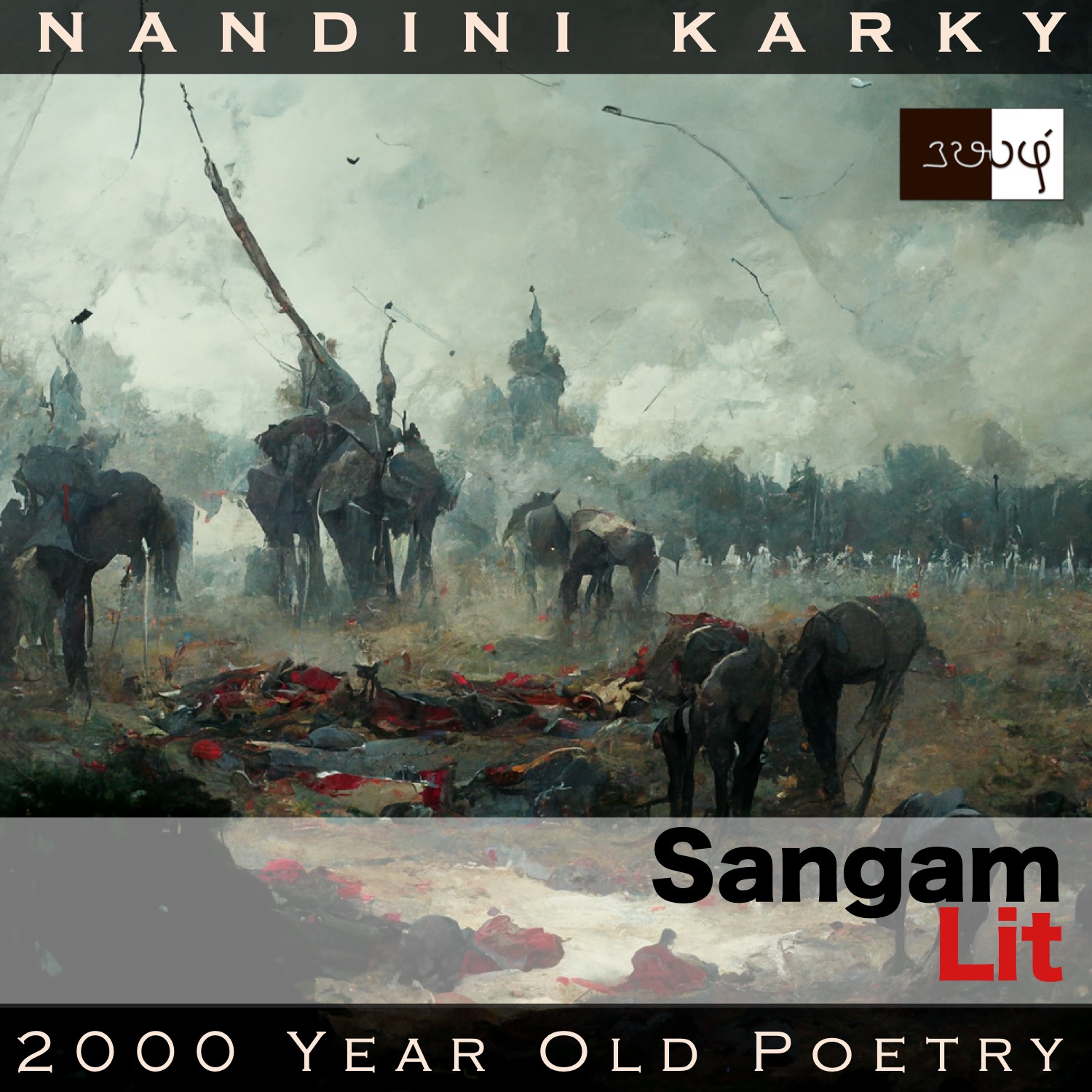Podcast: Play in new window | Download
Subscribe: Apple Podcasts | Spotify | Amazon Music | Android | iHeartRadio | Email | TuneIn | RSS | More
In this episode, we hear of all that’s ruined on a battlefield, as depicted in Sangam Literary work, Puranaanooru 63, penned about the Chera King Kudakko Neduncheralathan and Chozha king Verpahradakkai Peruviral Killi by the poet Paranar. Set in the category of ‘Thumbai Thinai’ or ‘battle of two kings’, the verse details the state of the animals, objects and people at the end of a tragic war.

எனைப் பல் யானையும் அம்பொடு துளங்கி,
விளைக்கும் வினை இன்றிப் படை ஒழிந்தனவே;
விறல் புகழ் மாண்ட புரவி எல்லாம்
மறத் தகை மைந்தரொடு ஆண்டுப் பட்டனவே;
தேர் தர வந்த சான்றோர் எல்லாம்,
தோல் கண் மறைப்ப, ஒருங்கு மாய்ந்தனரே;
விசித்து வினை மாண்ட மயிர்க் கண் முரசம்,
பொறுக்குநர் இன்மையின், இருந்து விளிந்தனவே;
சாந்து அமை மார்பில் நெடு வேல் பாய்ந்தென,
வேந்தரும் பொருது, களத்து ஒழிந்தனர்; இனியே,
என் ஆவதுகொல்தானே கழனி
ஆம்பல் வள்ளித் தொடிக் கை மகளிர்
பாசவல் முக்கி, தண் புனல் பாயும்,
யாணர் அறாஅ வைப்பின்
காமர் கிடக்கை அவர் அகன் தலை நாடே?
It’s as if the poet in the previous Puranaanooru poem handed over the baton to the illustrious poet Paranar, renowned for his historic accounts in both Aham and Puram literature. It’s the same battlefield where this Chozha and Chera king decided to fight against each other. The state of their armies at the end of the war is captured by the poet in these words:
“Many, many elephants, pierced by arrows, unable to act any more on the battlefield, have perished; Horses, famous for their strength have fallen along with their courageous riders; The leaders, who arrived in chariots many, with shields hiding their eyes, have all met their end; The tightly tied, sturdy war-drums made of hairy hide, having no one to play upon them, lie there silent; Tall spears have pierced the sandalwood-coated chest of the warring kings, and upon the battlefield, they have laid their lives down; Now, what is to become of their wide-spreading, beautiful nations with places of unceasing prosperity, where women make bangles out of white-lily stalks growing in the fields, feed on fresh flattened rice, and then play in the flowing cool streams therein?”
Time to delve into the nuances. The poet talks about how the mighty elephants have fallen under the attack of arrows. Not just these huge pachyderms but even the speedy horses are dead on the field, along with the soldiers who rode them there. The next segment of the army, the chariots, too lie there, bereft of the lords who rode them, shields in hand. After detailing about all these sections of the army, the poet turns his attention to the two, the reason for all this destruction, the Chera and Chozha kings, and points out how their chests coated with sandalwood, are now streaked with blood, pierced by tall spears. It’s at this time the poet wonders what will become of the fertile lands of these two kings, and to talk about their riches, he mentions how women make bangles out of white-lily stems, eat puffed rice to their heart’s content, and delight in the cool streams that abound in those nations.
While the initial portion of the verse deals with the same tragic scenes at the end of a futile war, the last few lines give us an indication of what was considered true prosperity in a land. It’s interesting how the poet denotes the wealth of a nation not in the gold it has or trade it does, but on the happiness of the women. These lands are prosperous because women are truly content with their lives, the poet seems to say. And in that, is a fact that’s relevant not only in the ancient world but also, in our world today. It’s no coincidence that some of the high-income countries of the world such as Iceland, Norway, Denmark and Finland, which are also incidentally the happiest nations of the world, are where gender-equality is high and more and more women are not only educated but find themselves in elected offices. As this Sangam poem hints, instead of waging pointless wars, leaders should find ways to improve the lot of the women in their nations if they want to etch their names on the pages of history!




Share your thoughts...